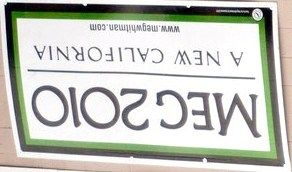Why Amateur Meg Lost
If you’ve been reading CalWatchDog.com, you know we called the election all along: that Meg Whitman’s campaign was a disaster. It was aloof and unfocused. I kept calling it amateurish. This link goes to a search of my 12 references here to her “amateur” campaign.
Now, the first insider to come forward is explaining that’s just how things were — from the beginning. Adam Mendelsohn advised Meg for a year, from February 2008 to January 2009.
It’s especially interesting because he left the campaign almost two years ago, yet the same problems persisted and never were corrected. But her top advisers — especially top honcho Mike Murphy — knew what was going on, collecting Meg’s millions anyway.
By contrast, Jerry Brown was focused like a pro, and won easily despite his dollars deficit.
We’re going to hear more dissections of what went wrong for Meg. But Mendelsohn tells all we need to know:
If you’re going to take somebody who’s an outsider who has no civic experience at all…..you have to create a really compelling reason for people to vote that person into office. My personal experience with the campaign often felt like they were approaching it like a marketing project rather than a political campaign.
It was always very difficult to determine what she was comfortable doing and what she was not comfortable doing. She and her adviser, Henry Gomez, were very, very protective of where they put her and what she was doing. I think she was so over-managed and so over-advised, that she became intimidated by the media. I think they spent more time thinking about everything she could say wrong rather than what she could say correctly.
I don’t see how you could think that someone can run for governor and not…consistently sit down with the journalists and media outlets that are covering you. It is as basic as running television commercials. You can’t just say ‘I’m not going to talk to the media.’ It doesn’t work. I know people want to think it works that way because of technology and everything else, but it doesn’t.
A lot of voters were aware that she was not accessible to the media. The stories about her reflected someone who had not answered a a lot of questions.
You had a candidate who was basically saying, ‘I’m not going to operate according to the traditional rules of journalism on the campaigns. I will dictate the new rules of journalism.’ And it turns out that you can’t do that.
Nov. 4, 2010
Related Articles
Contra Costa case a template for Prop. 26 abuse
In recent California history, small-government advocates have no more significant victory than the triumph of Proposition 26 in 2010. Here’s
Light-rail love affair: CA pols, media stuck in 1980s
Californians with a green streak are in love with mass transit — at least when it involves rail. Buses are
CA ‘anchor baby’ debate goes national
Republican presidential candidates were drawn deeper into the immigration controversies centered on California, as Donald Trump’s leading opponents sought a





